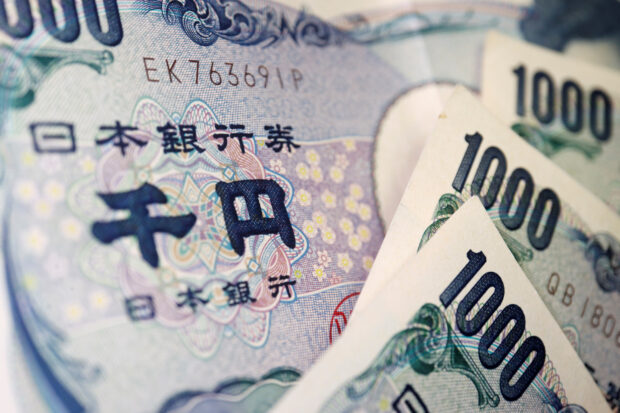Dollar struggles on rate cut expectations; yen on back foot

Banknotes of Japanese yen are seen in this illustration picture taken June 15, 2022. REUTERS/Florence Lo/Illustration/file photo
TOKYO – The U.S. dollar slipped against most major currencies on Wednesday as traders continued to sell the currency on bets that the U.S. Federal Reserve will soon begin cutting interest rates, ahead of inflation data later this week.
The exception was the yen, against which the dollar held firm after the Bank of Japan was mum on an end to its ultra-loose monetary policy the previous day.
Fed officials have been pushing back after last week’s Federal Open Market Committee meeting saw three rate cuts penciled in for 2024, sparking a rally in financial markets.
Market participants are currently pricing in a 67.5 percent chance of the first rate cut happening at the Fed’s March meeting, according to the CME FedWatch tool.
READ: BofA sees four rate cuts from Fed next year
“The proverbial genie is out of the bottle now, and the Fed either has to accept that and risk easing policy prematurely or push back very hard and cause a bit of volatility in the markets,” said Kyle Rodda, senior financial market analyst at Capital.com.
While Atlanta Federal Reserve President Raphael Bostic on Tuesday repeated on Tuesday that he expects two rate cuts likely in the second half of the year, he added that there is no “urgency” now.
On the same day, Richmond Fed President Thomas Barkin said whether the central bank can deliver on forecasts of rate cuts depends on how the economy performs.
The dollar index was last mostly flat at 102.20 after sliding more than 0.3 percent on Tuesday and hitting a four-month low of 101.76 last week.
In the end, the dollar‘s movement will depend on economic data supporting the rate cuts that have been priced in, said Rodda.
“The U.S. dollar is the inverse of the so-called ‘everything rally,’ which will beat on if the data confirms the need for cuts next year,” he said.
READ: Markets outpace central banks as rate cut bets fuel ‘everything rally’
The Fed’s preferred measure of underlying inflation, the core Personal Consumption Expenditures (PCE) price index, is due this week, and may provide clarity on whether inflation has slowed enough for the Fed to begin easing policy next year.
Meanwhile, the dollar had the yen pinned lower at 143.78 yen, after the Japanese currency fell to as low as 144.95 the previous day.
The yen had been trading around the low 142 range on Tuesday before the Bank of Japan announced its monetary policy decision, and weakened further after the Japanese central bank’s chief Kazuo Ueda gave no hints on an imminent end to negative interest rates.
Ueda’s “lack of ‘hawkishness’ should reinforce the perceptions next April is the earliest likeliest date for a policy shift,” National Bank of Australia’s Senior FX Strategist Rodrigo Catril said in a note.
Elsewhere, the euro held firm at $1.0973, while sterling was last trading at $1.2724 after making gains on a weaker dollar on Tuesday.
In cryptocurrencies, bitcoin last up 0.44 percent at $42,446.00.